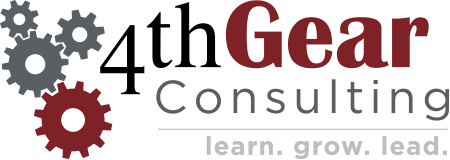A friend of mine once said to me “every day we win or learn.” It sounded witty then, but over time I’ve come to understand that thinking like that gives you permission to fail and learn on a daily basis. Great leaders know that they can’t just fix someone with a single conversation, or change a culture immediately any more than they can make a business an instant success. And along the way, they learn that progress is what’s important. Progress is about consistency and learning and winning only happens after enough progress is made. I constantly encounter leaders and managers who want to add more speed to the process of developing others or creating a more engaged team. This need for speed often causes them to make poor choices, overuse authority, and sometimes even push people or teams in the opposite direction of the one they so badly want them to go. Here are some things to consider as you tackle the important work of helping individuals or teams accomplish more.
Set your goals at a reasonable distance.
It’s tempting to think we can help others change behavior immediately or want something different overnight. It happens all the time in the movies. In the real world, though, we have to allow time to help shift someone’s thinking, improve their confidence, and make different choices in order for them to become more successful. Consider a team; it takes time for the group to come together, gain one another’s trust, and communicate effectively. Thinking that big changes should happen immediately is a recipe for frustration. The key is to set a goal that is reasonable and then focus on progress. No one has the capability to change the culture of an organization overnight, but you can absolutely make progress every day and have some big wins over a period of time. Once we think longer-term we tend to build a stronger foundation for change and focus more on making consistent progress.
Remember that failure is progress.
It sounds a little bit counter intuitive, but it’s true. What happened the first time you hopped on a bike to learn to ride? Did that fall help you make progress toward successfully riding the bike? Learning simply means interpreting data and feedback in a way that helps you make new, more successful choices. In fact, it’s exceptionally rare that learning happens without failure. Failure is a great indicator that we are trying, and it happens often when we are trying something new. When you are helping an individual or a team improve expect a lot of failure at first, and celebrate the effort it takes to try new things and explore new options. Contrary to how it may feel at the time, every failed attempt is a sign of progress. If you encounter a person who isn’t failing at something, you have found a person who isn’t making progress towards anything.
Change does not happen in a straight line.
There will be good days and bad days as you work to improve anything. There will be days where you feel like the person or the team is headed in the wrong direction, and your impulse will often be to become more forceful or more directive in order to correct the course. People often learn more from the bad days than the good ones, and the bad days are an opportunity to analyze, consider alternatives, and make new choices for tomorrow. Taking control back from people who have failed or had a bad day at a new task or challenge only undermines their confidence and kills their chances to learn from their mistakes. Setbacks provide an opportunity to slow down, support the individual and the team, and focus on what we will do differently tomorrow.
If we let our own sense of urgency get in the way of the learning process we destroy our ability to build stronger teams and individuals. As a result, we build people that wait for instructions or let the leader solve all of the problems.
Leadership is about learning; learning is about time, mistakes, and progress. Set yourself up for success as a leader by understanding how learning happens, and using that knowledge to consistently build stronger people, stronger teams, and a stronger business
Leading Through Influence
We develop better leaders so they can build a better future. Contact Us to learn about leader development via our training, workshops and executive coaching.


